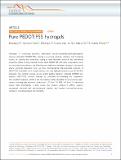| dc.contributor.author | Lu, Baoyang | |
| dc.contributor.author | Yuk, Hyunwoo | |
| dc.contributor.author | Lin, Shaoting | |
| dc.contributor.author | Jian, Nannan | |
| dc.contributor.author | Qu, Kai | |
| dc.contributor.author | Xu, Jingkun | |
| dc.contributor.author | Zhao, Xuanhe | |
| dc.date.accessioned | 2021-10-27T19:53:26Z | |
| dc.date.available | 2021-10-27T19:53:26Z | |
| dc.date.issued | 2019 | |
| dc.identifier.uri | https://hdl.handle.net/1721.1/133542 | |
| dc.description.abstract | © 2019, The Author(s). Hydrogels of conducting polymers, particularly poly(3,4-ethylenedioxythiophene):poly(styrene sulfonate) (PEDOT:PSS), provide a promising electrical interface with biological tissues for sensing and stimulation, owing to their favorable electrical and mechanical properties. While existing methods mostly blend PEDOT:PSS with other compositions such as non-conductive polymers, the blending can compromise resultant hydrogels’ mechanical and/or electrical properties. Here, we show that designing interconnected networks of PEDOT:PSS nanofibrils via a simple method can yield high-performance pure PEDOT:PSS hydrogels. The method involves mixing volatile additive dimethyl sulfoxide (DMSO) into aqueous PEDOT:PSS solutions followed by controlled dry-annealing and rehydration. The resultant hydrogels exhibit a set of properties highly desirable for bioelectronic applications, including high electrical conductivity (~20 S cm −1 in PBS, ~40 S cm −1 in deionized water), high stretchability (> 35% strain), low Young’s modulus (~2 MPa), superior mechanical, electrical and electrochemical stability, and tunable isotropic/anisotropic swelling in wet physiological environments. | |
| dc.language.iso | en | |
| dc.publisher | Springer Science and Business Media LLC | |
| dc.relation.isversionof | 10.1038/s41467-019-09003-5 | |
| dc.rights | Creative Commons Attribution 4.0 International license | |
| dc.rights.uri | https://creativecommons.org/licenses/by/4.0/ | |
| dc.source | Nature | |
| dc.title | Pure PEDOT:PSS hydrogels | |
| dc.type | Article | |
| dc.contributor.department | Massachusetts Institute of Technology. Department of Mechanical Engineering | |
| dc.contributor.department | Massachusetts Institute of Technology. Department of Civil and Environmental Engineering | |
| dc.relation.journal | Nature Communications | |
| dc.eprint.version | Final published version | |
| dc.type.uri | http://purl.org/eprint/type/JournalArticle | |
| eprint.status | http://purl.org/eprint/status/PeerReviewed | |
| dc.date.updated | 2019-07-18T14:50:30Z | |
| dspace.orderedauthors | Lu, B; Yuk, H; Lin, S; Jian, N; Qu, K; Xu, J; Zhao, X | |
| dspace.date.submission | 2019-07-18T14:50:32Z | |
| mit.journal.volume | 10 | |
| mit.journal.issue | 1 | |
| mit.metadata.status | Authority Work and Publication Information Needed | |
